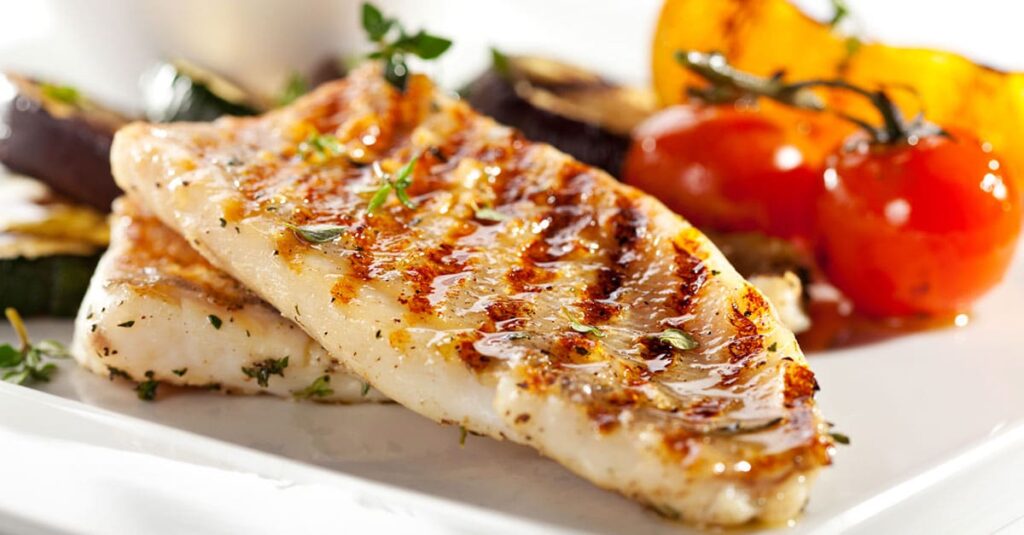The health of the oceans, and the fish that move around them, is being constantly monitored, and so the advice on which species of fish and seafood can be served sustainably is also updated on a regular basis. This means that chefs need to think about building flexibility into menus in order to meet increasing consumer expectations that operators will take a responsible approach to sourcing food and drink.
The Marine Conservation Society (MCS) released its newly updated Good Fish Guide ratings earlier this month, offering the latest guidance on the sustainability status of a whole range of species. For example, one change is that line-caught sea bass from British waters now has a yellow rating, meaning it can be used with caution, upgrading it from a ‘don’t use’ red rating.
Sea bass is a popular choice on menus, but it’s good practice for chefs to use the MCS guide and its ratings to plan a varied and regularly changing seafood offer, rather than rely on a few species.
We’re encouraging our customers to recognise the diversity of the fish and seafood available with menu descriptions such as ‘catch of the day’ and ‘market fish’. Sea bass can easily be rotated on special boards with other popular species such as plaice, sole and sea bream.
Make the swap
A particular challenge flagged up by the MCS is that we’re creatures of habit, something which holds just as true when we eat out as at any other time. When it comes to fish and seafood, we tend to order the same five species: cod, haddock, salmon, prawns and tuna. Even where these species aren’t a particular concern in terms of sustainability, it can be a better environmental choice to vary the offer.
The MCS is urging everyone to ‘make the swap’ for different species, and chefs have an important part or play in this by offering a more diverse choice. The current status of the ‘Big Five’ species, as wells as MCS advice on swaps, is:
- Cod: UK stocks are doing very badly, although stocks from Iceland and the Northeast Arctic are healthy and currently at sustainable levels. MAKE THE SWAP for European hake, which thanks to good management and beneficial environmental conditions is now a sustainable choice.
- Haddock: Most stocks are doing well, with the best options coming from Rockall, Iceland, the Northeast Arctic, Scotland and the North Sea. MAKE THE SWAP for Coley, which is related to cod and haddock but not so well known, with the best options coming from Scotland and the North Sea.
- Tuna: Sustainability depends on species, location and fishing methods. The best options are skipjack and albacore caught with pole and line, or handline. MAKE THE SWAP for Mackerel, ideally handline-caught from the Southwest of England, but any UK-caught mackerel is a good option.
- Salmon: Wild Atlantic salmon is not doing well, and the environmental performance of most farmed salmon still needs improving. Organically farmed salmon is the best choice. MAKE THE SWAP for Farmed Arctic Char or farmed freshwater Rainbow Trout, both of which are closely related to salmon. Look for UK-farmed stocks as the most sustainable choice.
- Prawns: Sourced from all over the world, prawns can be sustainable, depending on what species they are, and where and how they were caught or farmed. Generally, prawns with a label such as Organic, MSC or ASC are the best choice. MAKE THE SWAP for Rope-Grown Mussels, which are grown using low-impact methods, harvested by hand, and get the food they need from the sea around them.
Lynx Purchasing is a member of the Sustainable Seafood Coalition (SSC) which is working to ensure that all fish and seafood sold in the UK comes from sustainable sources. We’re the first purchasing group to join, and our membership is part of the wider commitment to sustainability across our business.
The oceans are in the front line when it comes to the challenge of responsible sourcing, and hospitality operators have great influence in their buying choices. The SSC code, helps to establish consistency on labelling and sourcing within the seafood supply chain. There is also a sound business case for working with a seafood supplier to ensure that fish and seafood is responsibly sourced, Featuring ‘catch of the day’ dishes on menus and specials boards has strong appeal to consumers who may not have the confidence to use a wider range of species at home.
For more information see www.sustainableseafoodcoalition.org .
For the latest Good Fish Guide from the MCS, see www.mcsuk.org/goodfishguide
